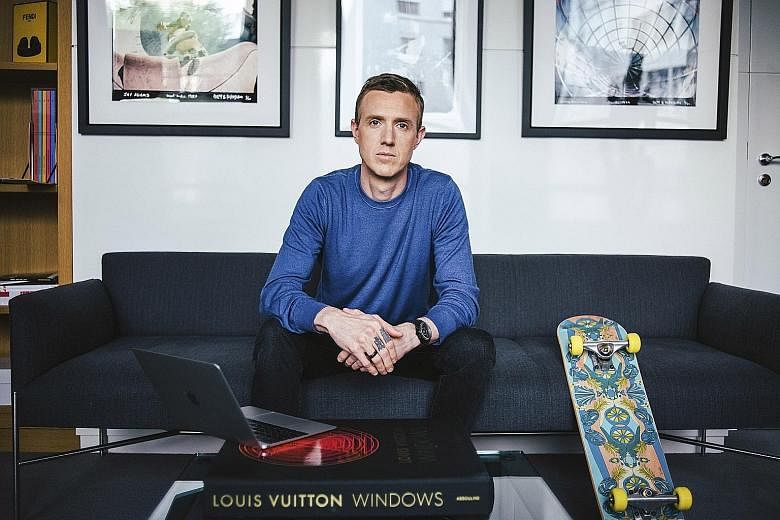PARIS • Mr Ian Rogers, chief digital officer of LVMH Moet Hennessy Louis Vuitton, sat in his sunlit office in Avenue Montaigne in Paris last month.
Using a finger, he punched in a passcode that would unlock access to Babylon - the top-secret project he has been working on since his arrival 18 months ago at the world's largest luxury group.
The project's 60 employees, many of whom have been hired from the Paris technology sector, have been working on the imminent unveiling of LVMH's high- stakes foray into multi-brand luxury e-commerce.
Rumours of a shopping platform that would fall under the branding umbrella of Le Bon Marche, LVMH's upmarket department store, have swirled for months.
Now, 24 Sevres, a boutique shopping website and mobile app named after the Paris street that Le Bon Marche is on, goes live in under a month.
It is a gamble that has divided many of the fashion industry's power players.
On the one hand, 24 Sevres will be yet another contender in an already crowded sector, where established rivals such as Yoox Net-a-Porter, FarFetch and MatchesFashion.com have long been jostling for the world's wealthiest consumers.
Anti-climactic performances by more recent entrants such as Style.com, Conde Nast's multi-million- dollar digital boutique, indicated that even the most reputable names in fashion can struggle when arriving late to the game.
A successful entry by LVMH, however, could shake up everything.
Controlled by French billionaire Bernard Arnault, the conglomerate owns 70 luxury brands, including Christian Dior, Louis Vuitton, Bulgari, Fendi and Givenchy.
LVMH wields hefty firepower, thanks to its financial footing, a monopoly over so many labels and hundreds of stores worldwide.
"Le Bon Marche is already a multi-brand physical retailer. Moving that store online is a clear and natural next step," said Exane BNP Paribas' luxury goods analyst Luca Solca.
"Of course, the natural advantage for LVMH is that it can get so many brands to play ball straight away because the businesses belong to them. Easy, no?"
Not so fast. LVMH has previously faltered in the multi-brand luxury space. The website, eLuxury, closed in 2009, was a rare and high-profile misstep. What makes the group think it can succeed now where it has failed before?
Still, there is no question that this e-commerce endeavour is extensive and eagerly anticipated.
Mr Rogers said LVMH had considered every branding possibility for 24 Sevres, which will initially stock only women's wear, but settled on maintaining a connection to Le Bon Marche because of its 160-year history as a pioneer in catalogue sales.
"I find it interesting that the Parisian perspective on fashion has been missing from the e-commerce landscape until now," he said.
"In my view, it is a conspicuous absence and a huge market gap that we intend to fill."
In many ways, 24 Sevres shares characteristics with its more established rivals, including fast delivery times to scores of international locations; chatbots or stylists-on- demand; glossy packaging, complete with Eiffel Tower cut-out pop-ups and love notes from Paris; and an efficient check-out process.
Yet, of the 150 brands initially on 24 Sevres, only about 20 to 30 will be LVMH-owned (that will include Louis Vuitton and Dior, neither of which are available via any other multi-brand online boutique).
In the case of LVMH-owned businesses, it will be possible to source inventory from across those brands' independent retail networks.
For non-LVMH labels, inventory will either be acquired wholesale or controlled by those brands that operate their own shop-in-shop- style retail channel - the same model operated by the store.
"Don't think of this as the LVMH e-commerce project. Think of this as us taking Le Bon Marche international via the Internet," Mr Rogers said, playing down expectations for the first step of an overhaul of the group's approach to reaching customers.
The initial success of the project will be measured by sales, although he emphasised that LVMH is a group that takes a long-term view.
Referring to eLuxury, he added: "We don't want to be early adopters. We have been before and we paid the price for that.
"And when it comes to the Internet specifically, there isn't necessarily a reward for being first.
"There is, however, a major focus on omnichannel and experience and we are moving from a mass culture to a mass of niches.
"If there's quality in what you do, you're not threatened.
"Timing-wise, this is exactly where LVMH wants to be."
NYTIMES

